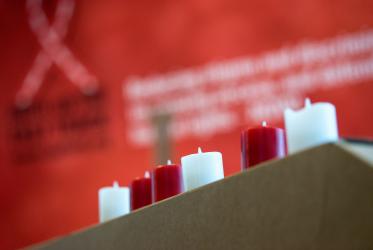A new report titled “Defeating AIDS–Advancing global health” was appreciated as a significant resource in encouraging an effective global AIDS response by Dr Isabel Apawo Phiri, associate general secretary of the World Council of Churches (WCC).
The report, launched on 25 June in London, United Kingdom, by UNAIDS and the Lancet Commission urges the countries most affected by HIV to focus on stopping new HIV infections and expanding access to antiretroviral treatment or risk the epidemic rebounding.
The new report shows that innovations in the AIDS response should be exploited to meet future global health challenges. It urges the countries most affected by HIV to focus on stopping new HIV infections and expanding access to antiretroviral treatment or risk the epidemic rebounding.
Phiri, who serves as a commissioner of the UNAIDS-Lancet Commission on Defeating AIDS - Advancing global health as a faith community representative, said the report is a valuable tool which can help churches address the crucial issue of HIV and AIDS in more sustainable ways.
“This report testifies the importance of keeping HIV and AIDS response on the post 2015 health agenda while promoting a holistic approach. This has also been the approach of WCC. While substantial progress has been made towards zero new HIV infections, zero discrimination and zero AIDS-related deaths, the report shows us that more work still needs to be done among the key populations,” said Phiri.
She continued, “The report singles out the adolescent girls who are at the top list of the risk group. The faith communities need to ensure that the sex education that we are offering this age group is informed by evidence, accurate and complete in order to protect life in our quest for justice and peace.”
The new report is critical of countries that have become complacent, highlighting that some countries with previously stable or declining HIV epidemics have shown trends of increasing risky sexual behaviours among at-risk groups over the past five years, with new HIV infections on the rise.
The report makes seven key recommendations, leading with the urgent need to scale up AIDS efforts, get serious about HIV prevention, and continue expanding access to treatment. Other recommendations include efficient mobilisation of more resources for HIV prevention, treatment, and research, and for robust, transparent governance and accountability for HIV and health.
The Lancet Commission was established in 2013 by UNAIDS and The Lancet, and brings together 38 heads of state and political leaders, HIV and health experts, young people, activists, scientists, and private sector representatives to ensure that lessons learned in the AIDS response can be applied to transform how countries and partners approach health and development.
In the UNAIDS Lancet Commission press release Professor Peter Piot is quoted as saying, “We must face hard truths—if the current rate of new HIV infections continues, merely sustaining the major efforts we already have in place will not be enough to stop deaths from AIDS increasing within five years in many countries. Expanding sustainable access to treatment is essential, but we will not treat ourselves out of the AIDS epidemic. We must also reinvigorate HIV prevention efforts, particularly among populations at highest risk, while removing legal and societal discrimination.”
Michel Sidibé, executive director of UNAIDS and co-convenor of the Commission warns, “We have to act now. The next five years provide a fragile window of opportunity to fast-track the response and end the AIDS epidemic by 2030. If we don’t, the human and financial consequences will be catastrophic.”.
And Lancet Editor-in-Chief and co-convenor of the Commission Dr Richard Horton is quoted as saying, “The movement created by the AIDS response is unprecedented—a system of checks and balances from a people-centred approach is one that more global health institutions should adopt. Identifying multi-sectoral stakeholders early will save time and money by ensuring the best solutions reach the right people.”
Through its programmes such as the Ecumenical HIV and AIDS Initiatives and Advocacy and the Ecumenical Advocacy Alliance, the WCC promotes and equips “HIV competent” churches through theological resources and training, and campaigns for strong and sustained HIV responses with justice and dignity at their core.
UNAIDS and Lancet Commission press release of 25 June 2015
Report "Defeating AIDS–Advancing global health"








